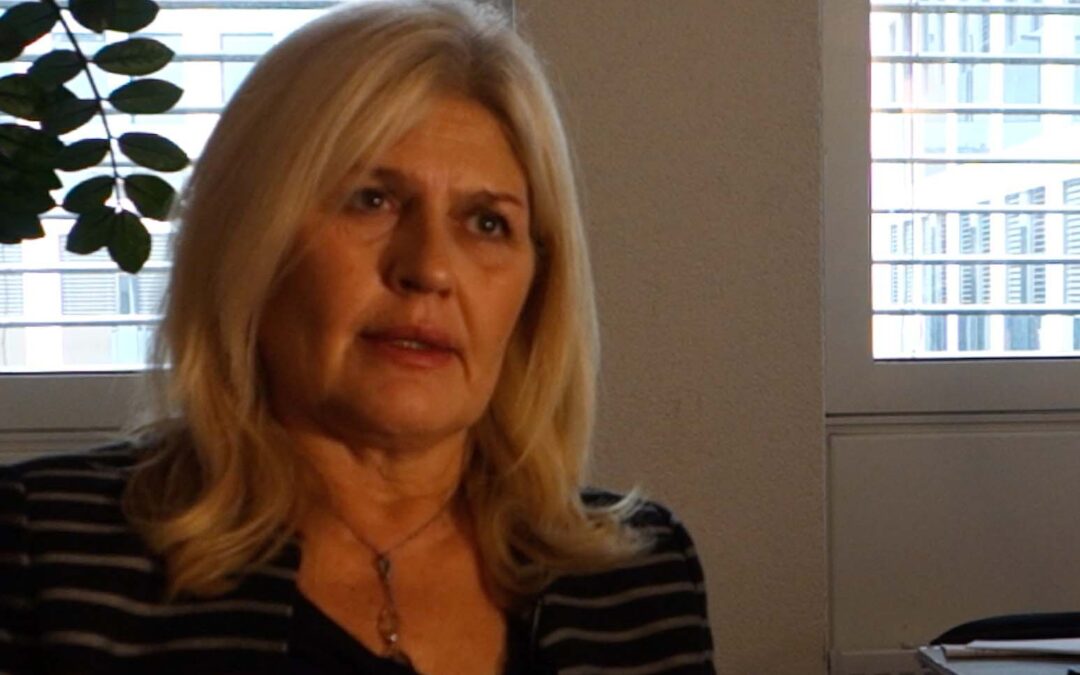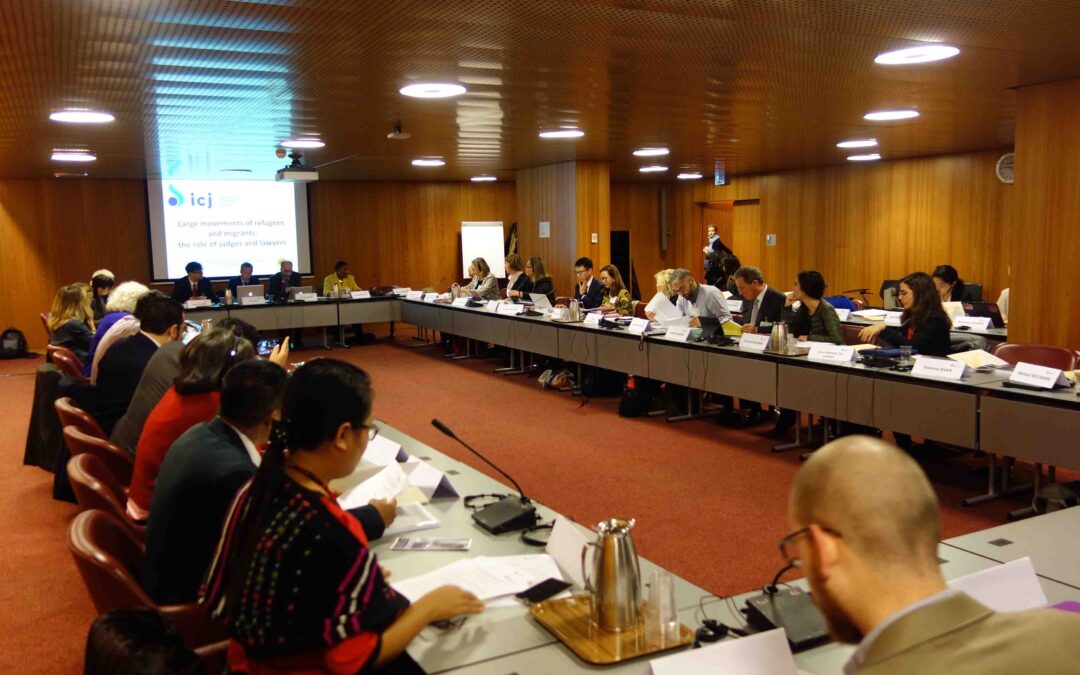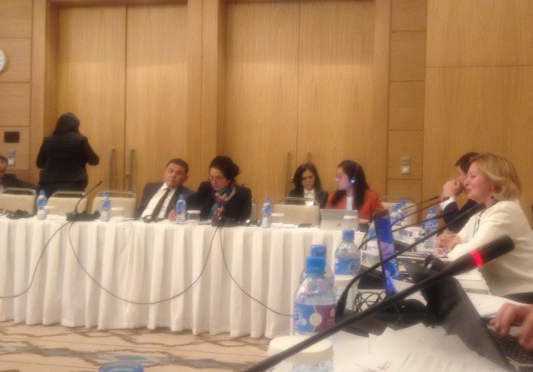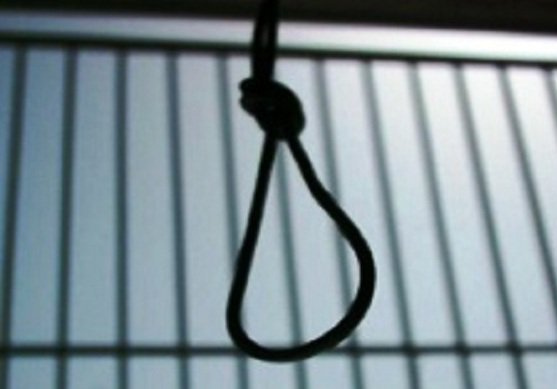
Nov 28, 2016 | News
The ICJ, along with a number of other NGOs, issued a joint statement expressing solidarity for the families of executed prisoners in Singapore.
The statement was issued following the execution of a Nigerian national, Chijioke Stephen Obioha, and a Malaysian national, Devendran a/l Supramaniam in Singapore on 18 November 2016.
The full statement can be downloaded here:
singapore-joint-ngo-statement-singapore-executions-news-web-story-2016-eng (PDF)

Nov 25, 2016 | Multimedia items, News, Video clips
The ICJ has launched a new women’s rights defenders profile series, beginning with ICJ Commissioner and Justice of the Supreme Court of Serbia, Radmila Dragicevic-Dicic.
The monthly profile series, introducing the work of ICJ Commissioners and Honorary Members on women’s rights, has been launched to coincide with the International Day to Eliminate Violence against Women and the first day of the 16 Days of Activism Against Gender-Based Violence Campaign.
The Judges Association of Serbia was established by Radmila and others in 1997, during the regime of Slobodan Milosevic. The Association was formed under the slogan ‘I do not agree’ in opposition to the misuse of the judiciary. Many women were involved in this fight against corruption and in protection of the independence of the judiciary.
In the year 2000, shortly before the fall of Milosevic, Radmila was one of fifteen judges that were dismissed because of their opposition to the repressive regime; although she was quickly reinstated following the elections that took place later that year.
During the civil war period in the 1990s, violence against women grew significantly and domestic violence was rampant in Serbia. Radmila, and other women in the judiciary, worked on issues of organized crime and human trafficking and they were brave to do so as the State couldn’t guarantee their security.
Radmila spoke of women’s continued obstacles in accessing justice and the important of protecting victims of violence. She commented that some States still lack the facilities, resources, personnel and awareness to provide adequate protection for victims.
Human trafficking continues to be one of the biggest problems that affects women, not only in Europe but globally. Justice Dragicevic-Dicic said it was beneficial for those working on women’s rights to share their experiences and learn from one another. Although the motivations and circumstances of women trafficked in different parts of the world may vary, all these women are subject to the same kinds of violence.
In the Serbian constitution, human trafficking is categorized as a crime against humanity and is taken very seriously, although this was not always the case.
Radmila spoke of one case she presided over that helped her to understand what it meant to be a victim. The case concerned two Ukrainian students who had dreamt of going to work in Germany to earn some money for their families but were trafficked into prostitution. She said that this case helped her to understand that anyone can be a victim.
It is everyone’s right to have dreams and to be naïve but no-one has the right to violate your rights. Radmila works to raise awareness amongst other judges that their role is not to judge the victims but those that have exploited them.
There remains a number of issues for victims of trafficking that Justice Dragicevic-Dicic highlighted, including ensuring the non-punishment, safety and protection of victims as well as addressing their access to compensation. Even where the offender isn’t known, victims are still entitled to the full rights of a victim within criminal proceedings.
The judiciary and independent organizations, like the Association of Serbian Judges and the International Commission of Jurists, have an important role in protecting the rights of women. Radmila explained that this can be done through promoting international standards, ensuring that victims are made visible and ensuring that States understand their responsibilities and obligations.
Judicial education on gender-based violence is important, not just in countries undergoing transitional periods, but for all countries where regional and/or international standards have been developed.
Radmila advised anyone interested in defending women’s rights that this work can be done from any position or microsystem that an individual or group is operating in, providing they take the time to educate themselves and build awareness. What is important is that as many people as possible come together to promote and protect women’s rights. Progress can be made, even if this is little by little.
“Sometimes you think you are doing little and you feel hopeless”, said Radmila, “but then I always say if you put a little seed somewhere then it will grow, after you leave, in one year, two years it’s always worth it.”
Watch the video interview:
The series of profiles introducing the work of ICJ Commissioners and Honorary Members on women’s rights was launched on 25 November 2016 to coincide with the International Day to Eliminate Violence against Women and the first day of the 16 Days of Activism Against Gender-Based Violence Campaign.

Nov 21, 2016 | News
Forty distinguished judges and lawyers from around the world have reaffirmed the essential role of judges and lawyers in securing the rule of law and human rights in relation to large movements of refugees and migrants, at the 7th annual ICJ Geneva Forum, 17-18 November 2016.
The 2016 Forum concluded with substantial agreement and reaffirmation of the essential role that judges and lawyers must be enabled to play, and must fulfil in practice, if the rights of refugees and migrants and the rule of law are to be secured, including in the context of large movements.
Participants exchanged challenges and solutions, and deliberated on a wide range of issues, including:
- on methods for best assessing evidence and credibility;
- on means for overcoming the legal, policy, and practical challenges when judges and lawyers face large numbers of claims and cases;
- on reforms to better enable immigration judges to meet basic standards of independence and impartiality;
- on the need for judiciaries and legal professions to ensure practitioners receive appropriate training and better access to information about international standards and reliable information about country situations;
- on the importance of effective access to competent legal advice and representation, including free of charge when necessary, for refugees and migrants to be able to exercise their rights and for judges to be able to decide cases in an efficient and just manner;
- on ways of supporting judges who courageously exercise their independence to uphold the rule of law and human rights, including in the face of interference or reprisal from the executive or legislative branches of government, or intense media criticism or majoritarian pressure;
- on ensuring that refugees and migrants who are victims of crime or victims of human rights violations are able to have effective access to justice and effective remedy, without discrimination arising from their status;
- on the importance of ensuring that legal processes are sensitive to the particular situation of women and children migrants, and migrants in detention.
Based on the discussions,the ICJ will develop and disseminate a set of Principles and recommendations on the role of judges and lawyers in situations of large-scale movement of refugees and migrants. The Principles will complement ICJ’s 2011 Practitioners’ Guide No 6 on Migration and International Human Rights Law.
More information about the Geneva Forum is available here.
For further details, please contact Matt Pollard, senior legal adviser, matt.pollard(a)icj.org
The 2016 Geneva Forum has been made possible with the support of the Republic and Canton of Geneva.
The ICJ is also grateful for the assistance of the Le Centre d’Accueil – Genève Internationale (CAGI) and Swiss Confederation.

Nov 21, 2016 | Advocacy, News
The ICJ and five other human rights groups are calling on the Malaysian authorities to drop all charges against the Bersih organizers and activists, return all items confiscated from their offices and stop making further arbitrary arrests in connection with these events.
Download the statement here:
malaysia-bersih-5-statement-advocacy-2016-eng (full text in PDF)

Nov 18, 2016 | Agendas, Events, News
Today, the ICJ holds a round table discussion in Tashkent, Uzbekistan on “Comparative Perspectives on Judicial Ethics”.
The event takes place as part of the Central Asian Forum Expert Forum organized by the Organisation for Cooperation and Security in Europe (OSCE) in Tashkent this year.
International standards, and national standards of judicial ethics in Uzbekistan in other countries will be discussed at the event.
Participants will discuss questions of judicial independence, impartiality and accountability and disciplinary mechanisms.
Speakers at the event include Justice Ketil Lund (photo), an ICJ Commissioner and a former judge of the Supreme Court of Norway, Justice Tatiana Andreyeva, professor of law and a former Judge of the High Arbitration Court of the Russian Federation, as well as a representative of the Uzbekistan judiciary.
Legal practitioners and experts from across the Central Asian region will attend the event.
uzbekistan-side-event-tashkent-events-agenda-2016-rus (Agenda in Russian, PDF)

Nov 18, 2016 | News
The ICJ condemned Singapore’s execution of two people today and is concerned over the Singapore government’s lack of transparency with regards to its implementation of executions.
The government does not update the list of names and number of death row inmates and often does not give death row inmates and their families adequate notice prior to executions, the ICJ notes.
“The very short notice does not allow the death row inmates and their families enough time to file last minute appeals,” said Sam Zarifi, ICJ’s Asia Director.
“Singapore authorities, by hastening executions, hinder measures that could save the lives of those on death row, and also try to minimize public outcry over the executions,” he added.
Both Nigerian national Chijoke Stephen Obioha and Malaysian national Devendran A/L Supramaniam were convicted of drugs-related charges.
Chijoke Stephen Obioha was convicted of possession and trafficking of drugs on 30 December 2008, while Devandran was convicted on 29 July 2014 for importing 83.36 grams of diamorphine into Singapore.
The ICJ opposes capital punishment in all cases without exception and considers the death penalty a violation of the right to life and the right not to be subjected to cruel, inhuman or degrading treatment.
The ICJ calls on the Singapore government to publicly release the number of death row inmates awaiting execution, and the number and names of individuals who have been executed in 2016.
ICJ also calls on the Singapore government to immediately establish a moratorium on the use of the death penalty, with a view towards its abolition.
Contact:
Emerlynne Gil, ICJ’s Senior International Legal Adviser for Southeast Asia, t: +66840923575 ; e: emerlynne.gil(a)icj.org










